徐州工程学院必读书费尔巴哈论完整版
费尔巴哈论
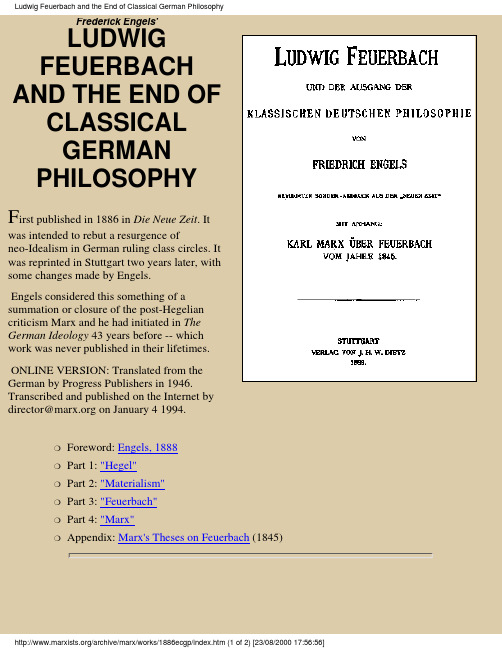
Frederick Engels'LUDWIGFEUERBACHAND THE END OFCLASSICALGERMANPHILOSOPHYF irst published in 1886 in Die Neue Zeit. Itwas intended to rebut a resurgence ofneo-Idealism in German ruling class circles. Itwas reprinted in Stuttgart two years later, withsome changes made by Engels.Engels considered this something of asummation or closure of the post-Hegeliancriticism Marx and he had initiated in TheGerman Ideology 43 years before -- whichwork was never published in their lifetimes.ONLINE VERSION: Translated from theGerman by Progress Publishers in 1946.Transcribed and published on the Internet bydirector@ on January 4 1994.Foreword: Engels, 1888rPart 1: "Hegel"rPart 2: "Materialism"rPart 3: "Feuerbach"rPart 4: "Marx"rAppendix: Marx's Theses on Feuerbach (1845) rMarx / Engels Archive Marxist writers' ArchivesFrederick Engels'LUDWIGFEUERBACHAND THE END OFCLASSICALGERMANPHILOSOPHYFOREWORDI n the preface to A Contribution to the Critiqueof Political Economy, published in Berlin,1859, Karl Marx relates how the two of us inBrussels in the year 1845 set about:"to work out in common the oppositionof our view" -- the materialist conceptionof history which was elaborated mainlyby Marx -- "to the ideological view ofGerman philosophy, in fact, to settleaccounts with our erstwhile philosophicalconscience. The resolve was carried outin the form of a criticism ofpost-Hegelian philosophy. Themanuscript, two large octavo volumes,had long reached its place of publicationin Westphalia when we received the newsthat altered circumstances did not allowof its being printed. We abandoned themanuscript to the gnawing criticism ofthe mice all the more willingly as we hadachieved our main purpose --self-clarification!"Since then more than 40 years have elapsed and Marx died without either of us having had an opportunity of returning to the subject. We have expressed ourselves in various places regarding ourrelation to Hegel, but nowhere in a comprehensive, connected account. To Feuerbach, who after all in many respects forms an intermediate link between Hegelian philosophy and our conception, we never returned.In the meantime, the Marxist world outlook has found representatives far beyond the boundaries of Germany and Europe and in all the literary languages of the world. On the other hand, classical German philosophy is experiencing a kind of rebirth abroad, especially in England and Scandinavia, and even in Germany itself people appear to be getting tired of the pauper's broth of eclecticism which is ladled out in the universities there under the name of philosophy.In these circumstances, a short, coherent account of our relation to the Hegelian philosophy, of how we proceeded, as well as of how we separated, from it, appeared to me to be required more and more. Equally, a full acknowledgement of the influence which Feuerbach, more than any other post-Hegelian philosopher, had upon us during our period of storm and stress, appeared to me to be an undischarged debt of honor. I therefore willingly seized the opportunity when the editors of Neue Zeit asked me for a critical review of Starcke's book on Feuerbach. My contribution was published in that journal in the fourth and fifth numbers of 1886 and appears here in revised form as a separate publication.Before sending these lines to press, I have once again ferreted out and looked over the old manuscript of 1845-46 [The German Ideology]. The section dealing with Feuerbach is not completed. The finished portion consists of an exposition of the materialist conception of history which proves only how incomplete our knowledge of economic history still was at that time. It contains no criticism of Feuerbach's doctrine itself; for the present purposes, therefore, it was unusable. On the other hand, in an old notebook of Marx's I have found the 11 Theses on Feuerbach, printed here as an appendix. These are notes hurriedly scribbled down for later elaboration, absolutely not intended for publication, but invaluable as the first document in which is deposited the brilliant germ of the new world outlook. FREDERICK ENGELSLondonFebruary 21, 1888[ On to the main work ]Ludwig FeuerbachTable of ContentsMarx / Engels Archive Marxist writers' ArchivesFrederick Engels'LUDWIGFEUERBACHAND THE END OFCLASSICALGERMANPHILOSOPHYpart 1"HEGEL"T he volume before us [1] carries us back to aperiod which, although in time no more than ageneration behind us, has become as foreign tothe present generation in Germany as if it werealready a hundred years old. Yet it was theperiod of Germany's preparation for theRevolution of 1848; and all that has happenedsince then in our country has been merely acontinuation of 1848, merely the execution of thelast will and testament of the revolution.Just as in France in the 18th century, so in Germany in the 19th, a philosophical revolution ushered in the political collapse. But how different the two looked! The French were in open combat against all official science, against the church and often also against the state; their writings were printed across the frontier, in Holland or England, while they themselves were often in jeopardy of imprisonment in the Bastille. On the other hand, the Germans were professors, state-appointed instructors of youth; their writings were recognized textbooks, and the termination system of the whole development -- the Hegelian system -- was even raised, as it were, to the rank of a royal Prussian philosophy of state! Was it possible that a revolution could hide behind these professors, behind their obscure, pedantic phrases, their ponderous, wearisome sentences? Were not precisely these people who were then regarded as the representatives of the revolution, the liberals, the bitterest opponents of this brain-confusing philosophy? But what neither the government nor the liberals saw was seen at least by one man as early as 1833, and this man was indeed none other than Heinrich Heine. [2]Let us take an example. No philosophical proposition has earned more gratitude from narrow-minded governments and wrath from equally narrow-minded liberals than Hegel's famous statement: "All that is real is rational; and all that is rational is real." That was tangibly a sanctification of things that be, a philosophical benediction bestowed upon despotism, police government, Star Chamber proceedings andcensorship. That is how Frederick William III and how his subjects understood it. But according to Hegel certainly not everything that exists is also real, without further qualification. For Hegel the attribute of reality belongs only to that which at the same time is necessary: "In the course of its development reality proves to be necessity." A particular governmental measure -- Hegel himself cites the example of "a certain tax regulation" -- is therefore for him by no means real without qualification. That which is necessary, however, proves itself in the last resort to be also rational; and, applied to the Prussian state of that time, the Hegelian proposition, therefore, merely means: this state is rational, corresponds to reason, insofar as it is necessary; and if it nevertheless appears to us to be evil, but still, in spite of its evil character, continues to exist, then the evil character of the government is justified and explained by the corresponding evil character of its subjects. The Prussians of that day had the government that they deserved.Now, according to Hegel, reality is, however, in no way an attribute predictable of any given state of affairs, social or political, in all circumstances and at all times. On the contrary. The Roman Republic was real, but so was the Roman Empire, which superseded it. In 1789, the French monarchy had become so unreal, that is to say, so robbed of all necessity, so irrational, that it had to be destroyed by the Great Revolution, of which Hegel always speaks with the greatest enthusiasm. In this case, therefore, the monarchy was the unreal and the revolution the real. And so, in the course of development, all that was previously real becomes unreal, loses it necessity, its right of existence, its rationality. And in the place of moribund reality comes a new, viable reality -- peacefully if the old has enough intelligence to go to its death without a struggle; forcibly if it resists this necessity. Thus the Hegelian proposition turns into its opposite through Hegelian dialectics itself: All that is real in the sphere of human history, becomes irrational in the process of time, is therefore irrational by its very destination, is tainted beforehand with irrationality, and everything which is rational in the minds of men is destined to become real, however much it may contradict existing apparent reality. In accordance with all the rules of the Hegelian method of thought, the proposition of the rationality of everything which is real resolves itself into the other proposition: All that exists deserves to perish.But precisely therein lay the true significance and the revolutionary character of the Hegelian philosophy (to which, as the close of the whole movement since Kant, we must here confine ourselves), that it once and for all dealt the death blow to the finality of all product of human thought and action. Truth, the cognition of which is the business of philosophy, was in the hands of Hegel no longer an aggregate of finished dogmatic statements, which, once discovered, had merely to be learned by heart. Truth lay now in the process of cognition itself, in the long historical development of science, which mounts from lower to ever higher levels of knowledge without ever reaching, by discovering so-called absolute truth, a point at which it can proceed no further, where it would have nothing more to do than to fold its hands and gaze with wonder at the absolute truth to which it had attained. And what holds good for the realm of philosophical knowledge holds good also for that of every other kind of knowledge and also for practical action. Just as knowledge is unable to reach a complete conclusion in a perfect, ideal condition of humanity, so is history unable to do so; a perfect society, a perfect "state", are things which can only exist in imagination. On the contrary, all successive historical systems are only transitory stages in the endless course of development of human society from the lower to the higher. Each stage is necessary, and therefore justified for the time and conditions to which it owes its origin. But in the face of new, higher conditions which gradually develop in its own womb, it loses vitality and justification. It must give way to a higher stage which will also in its turn decay and perish. Just as the bourgeoisie bylarge-scale industry, competition, and the world market dissolves in practice all stable time-honoredinstitutions, so this dialectical philosophy dissolves all conceptions of final, absolute truth and of absolute states of humanity corresponding to it. For it [dialectical philosophy], nothing is final, absolute, sacred. It reveals the transitory character of everything and in everything; nothing can endure before it except the uninterrupted process of becoming and of passing away, of endless ascendancy from the lower to the higher. And dialectical philosophy itself is nothing more than the mere reflection of this process in the thinking brain. It has, of course, also a conservative side; it recognizes that definite stages of knowledge and society are justified for their time and circumstances; but only so far. The conservatism of this mode of outlook is relative; its revolutionary character is absolute -- the only absolute dialectical philosophy admits.It is not necessary, here, to go into the question of whether this mode of outlook is thoroughly in accord with the present state of natural science, which predicts a possible end even for the Earth, and for its habitability a fairly certain one; which therefore recognizes that for the history of mankind, too, there is not only an ascending but also a descending branch. At any rate, we still find ourselves a considerable distance from the turning-point at which the historical course of society becomes one of descent, and we cannot expect Hegelian philosophy to be concerned with a subject which natural science, in its time, had not at all placed upon the agenda as yet.But what must, in fact, be said here is this: that in Hegel the views developed above are not so sharply delineated. They are a necessary conclusion from his method, but one which he himself never drew with such explicitness. And this, indeed, for the simple reason that he was compelled to make a system and, in accordance with traditional requirements, a system of philosophy must conclude with some sort of absolute truth. Therefore, however much Hegel, especially in his Logic, emphasized that this eternal truth is nothing but the logical, or, the historical, process itself, he nevertheless finds himself compelled to supply this process with an end, just because he has to bring his system to a termination at some point or other. In his Logic, he can make this end a beginning again, since here the point of the conclusion, the absolute idea -- which is only absolute insofar as he has absolutely nothing to say about it -- "alienates", that is, transforms, itself into nature and comes to itself again later in the mind, that is, in thought and in history. But at the end of the whole philosophy, a similar return to the beginning is possible only in one way. Namely, by conceiving of the end of history as follows: mankind arrives at the cognition of theself-same absolute idea, and declares that this cognition of the absolute idea is reached in Hegelian philosophy. In this way, however, the whole dogmatic content of the Hegelian system is declared to be absolute truth, in contradiction to his dialectical method, which dissolves all dogmatism. Thus the revolutionary side is smothered beneath the overgrowth of the conservative side. And what applies to philosophical cognition applies also to historical practice. Mankind, which, in the person of Hegel, has reached the point of working out the absolute idea, must also in practice have gotten so far that it can carry out this absolute idea in reality. Hence the practical political demands of the absolute idea on contemporaries may not be stretched too far. And so we find at the conclusion of the Philosophy of Right that the absolute idea is to be realized in that monarchy based on social estates which Frederick William III so persistently but vainly promised to his subjects, that is, in a limited, moderate, indirect rule of the possessing classes suited to the petty-bourgeois German conditions of that time; and, moreover, the necessity of the nobility is demonstrated to us in a speculative fashion.The inner necessities of the system are, therefore, of themselves sufficient to explain why a thoroughly revolutionary method of thinking produced an extremely tame political conclusion. As a matter of fact, the specific form of this conclusion springs from this, that Hegel was a German, and like his contemporary Goethe had a bit of the philistine's queue dangling behind. Each of them was an OlympianZeus in his own sphere, yet neither of them ever quite freed himself from German philistinism.But all this did not prevent the Hegelian system from covering an incomparably greater domain than any earlier system, nor from developing in this domain a wealth of thought, which is astounding even today. The phenomenology of mind (which one may call a parallel of the embryology and palaeontology of the mind, a development of individual consciousness through its different stages, set in the form of an abbreviated reproduction of the stages through which the consciousness of man has passed in the course of history), logic, natural philosophy, philosophy of mind, and the latter worked out in its separate, historical subdivisions: philosophy of history, of right, of religion, history of philosophy, aesthetics, etc. -- in all these different historical fields Hegel labored to discover and demonstrate the pervading thread of development. And as he was not only a creative genius but also a man of encyclopaedic erudition, he played an epoch-making role in every sphere. It is self-evident that owing to the needs of the "system" he very often had to resort to those forced constructions about which his pigmy opponents make such a terrible fuss even today. But these constructions are only the frame and scaffolding of his work. If one does not loiter here needlessly, but presses on farther into the immense building, one finds innumerable treasures which today still possess undiminshed value. With all philosophers it is precisely the "system" which is perishable; and for the simple reason that it springs from an imperishable desire of the human mind -- the desire to overcome all contradictions. But if all contradictions are once and for all disposed of, we shall have arrived at so-called absolute truth -- world history will be at an end. And yet it has to continue, although there is nothing left for it to do -- hence, a new, insoluble contradiction. As soon as we have once realized -- and in the long run no one has helped us to realize it more than Hegel himself --that the task of philosophy thus stated means nothing but the task that a single philosopher should accomplish that which can only be accomplished by the entire human race in its progressive development -- as soon as we realize that, there is an end to all philosophy in the hitherto accepted sense of the word. One leaves alone "absolute truth", which is unattainable along this path or by any single individual; instead, one pursues attainable relative truths along the path of the positive sciences, and the summation of their results by means of dialectical thinking. At any rate, with Hegel philosophy comes to an end; on the one hand, because in his system he summed up its whole development in the most splendid fashion; and on the other hand, because, even though unconsciously, he showed us the way out of the labyrinth of systems to real positive knowledge of the world.One can imagine what a tremendous effect this Hegelian system must have produced in the philosophy-tinged atmosphere of Germany. It was a triumphant procession which lasted for decades and which by no means came to a standstill on the death of Hegel. On the contrary, it was precisely from 1830 to 1840 that "Hegelianism" reigned most exclusively, and to a greater or lesser extent infected even its opponents. It was precisely in this period that Hegelian views, consciously or unconsciously, most extensively penetrated the most diversified sciences and leavened even popular literature and the daily press, from which the average "educated consciousness" derives its mental pabulum. But this victory along the whole front was only the prelude to an internal struggle.As we have seen, the doctrine of Hegel, taken as a whole, left plenty of room for giving shelter to the most diverse practical party views. And in the theoretical Germany of that time, two things above all were practical: religion and politics. Whoever placed the chief emphasis on the Hegelian system could be fairly conservative in both spheres; whoever regarded the dialectical method as the main thing could belong to the most extreme opposition, both in politics and religion. Hegel himself, despite the fairly frequent outbursts of revolutionary wrath in his works, seemed on the whole to be more inclined to the conservative side. Indeed, his system had cost him much more "hard mental plugging" than his method.Towards the end of the thirties, the cleavage in the school became more and more apparent. The Left wing, the so-called Young Hegelians, in their fight with the pietist orthodox and the feudal reactionaries, abandoned bit by bit that philosophical-genteel reserve in regard to the burning questions of the day which up to that time had secured state toleration and even protection for their teachings. And when in 1840, orthodox pietism and absolutist feudal reaction ascended the throne with Frederick William IV, open partisanship became unavoidable. The fight was still carried on with philosophical weapons, but no longer for abstract philosophical aims. It turned directly on the destruction of traditional religion and of the existing state. And while in the Deutsche Jahrbucher[3] the practical ends were still predominantly put forward in philosophical disguise, in the Rheinische Zeitung of 1842 the Young Hegelian school revealed itself directly as the philosophy of the aspiring radical bourgeoisie and used the meagre cloak of philosophy only to deceive the censorship.At that time, however, politics was a very thorny field, and hence the main fight came to be directed against religion; this fight, particularly since 1840, was indirectly also political. Strauss' Life of Jesus, published in 1835, had provided the first impulse. The theory therein developed of the formation of the gospel myths was combated later by Bruno Bauer with proof that a whole series of evangelic stories had been fabricated by the authors themselves. The controversy between these two was carried out in the philosophical disguise of a battle between "self-consciousness" and "substance". The question whether the miracle stories of the gospels came into being through unconscious-traditional myth-creation within the bosom of the community or whether they were fabricated by the evangelists themselves was magnified into the question whether, in world history, "substance" or "self-consciousness" was the decisive operative force. Finally came Stirner, the prophet of contemporary anarchism -- Bakunin has taken a great deal from him -- and capped the sovereign "self-consciousness" by his sovereign "ego". [4] We will not go further into this side of the decomposition process of the Hegelian school. More important for us is the following: the main body of the most determined Young Hegelians was, by the practical necessities of its fight against positive religion, driven back to Anglo-French materialism. This brought them into conflict with the system of their school. While materialism conceives nature as the sole reality, nature in the Hegelian system represents merely the "alienation" of the absolute idea, so to say, a degradation of the idea. At all events, thinking and its thought-product, the idea, is here the primary, nature the derivative, which only exists at all by the condescension of the idea. And in this contradiction they floundered as well or as ill as they could.Then came Feuerbach's Essence of Christianity. [5] With one blow, it pulverized the contradiction, in that without circumlocutions it placed materialism on the throne again. Nature exists independently of all philosophy. It is the foundation upon which we human beings, ourselves products of nature, have grown up. Nothing exists outside nature and man, and the higher beings our religious fantasies have created are only the fantastic reflection of our own essence. The spell was broken; the "system" was exploded and cast aside, and the contradiction, shown to exist only in our imagination, was dissolved. One must himself have experienced the liberating effect of this book to get an idea of it. Enthusiasm was general; we all became at once Feuerbachians. How enthusiastically Marx greeted the new conception and how much -- in spite of all critical reservations -- he was influenced by it, one may read in the The Holy Family. [6]Even the shortcomings of the book contributed to its immediate effect. Its literary, sometimes even high-flown, style secured for it a large public and was at any rate refreshing after long years of abstract and abstruse Hegelianizing. The same is true of its extravagant deification of love, which, coming afterthe now intolerable sovereign rule of "pure reason", had its excuse, if not justification. But what we must not forget is that it was precisely these two weaknesses of Feuerbach that "true Socialism", which had been spreading like a plague in educated Germany since 1844, took as its starting-point, putting literary phrases in the place of scientific knowledge, the liberation of mankind by means of "love" in place of the emancipation of the proletariat through the economic transformation of production -- in short, losing itself in the nauseous fine writing and ecstacies of love typified by Herr Karl Grun.Another thing we must not forget is this: the Hegelian school disintegrated, but Hegelian philosophy was not overcome through criticism; Strauss and Bauer each took one of its sides and set it polemically against the other. Feuerbach smashed the system and simply discarded it. But a philosophy is not disposed of by the mere assertion that it is false. And so powerful a work as Hegelian philosophy, which had exercised so enormous an influence on the intellectual development of the nation, could not be disposed of by simply being ignored. It had to be "sublated" in its own sense, that is, in the sense that while its form had to be annihilated through criticism, the new content which had been won through it had to be saved. How this was brought about we shall see below.But in the meantime, the Revolution of 1848 thrust the whole of philosophy aside as unceremoniously as Feuerbach had thrust aside Hegel. And in the process, Feuerbach himself was also pushed into the background.[ To Part 2: "Materialism" ]Ludwig FeuerbachTable of ContentsMarx / Engels Archive Marxist writers' ArchivesFrederick Engels'LUDWIGFEUERBACHAND THE END OFCLASSICALGERMANPHILOSOPHYpart 2"MATERIALISM"T he great basic question of all philosophy,especially of more recent philosophy, is thatconcerning the relation of thinking and being. From the very early times when men, still completely ignorant of the structure of their own bodies, under the stimulus of dream apparitions [7] came to believe that their thinking and sensation were not activities of their bodies, but of a distinct soul which inhabits the body and leaves it at death -- from this time men have been driven to reflect about the relation between this soul and the outside world. If, upon death, it took leave of the body and lived on, there was no occassion to invent yet another distinct death for it. Thus arose the idea of immortality, which at that stage of development appeared not at all as a consolation but as a fate against which it was no use fighting, and often enough, as among the Greeks, as a positive misfortune. The quandry arising from the common universal ignorance of what to do with this soul, once its existence had been accepted, after the death of the body, and not religious desire for consolation, led in a general way to the tedious notion of personal immortality. In an exactly similar manner, the first gods arose through the personification of natural forces. And these gods in the further development of religions assumed more and more extramundane form, until finally by a process of abstraction, I might almost say of distillation, occurring naturally in the course of man's intellectual development, out of the many more or less limited and mutually limiting gods there arose in the minds of men the idea of the one exclusive God of the monotheistic religions.Thus the question of the relation of thinking to being, the relation of the spirit to nature -- the paramount question of the whole of philosophy -- has, no less than all religion, its roots in the narrow-minded and ignorant notions of savagery. But this question could for the first time be put forward in its whole acuteness, could achieve its full significance, only after humanity in Europe had awakened from the long hibernation of the Christian Middle Ages. The question of the position of thinking in relation to being, a question which, by the way, had played a great part also in the scholasticism of the Middle Ages, the question: which is primary, spirit or nature -- that question, in relation to the church, was sharpened into this: Did God create the world or has the world been in existence eternally?。
费尔巴哈论第一部分

费尔巴哈论第一部分第一部分通过分析黑格尔哲学的革命意义及其内在矛盾,揭示出其哲学的合理内核;分析黑格尔哲学解体的必然性,阐明费尔巴哈哲学的出现及其意义。
(一)黑格尔哲学的革命意义及其内在矛盾1、黑格尔哲学的革命意义“在这些教授后面,在他们迂腐晦涩的言辞后面,在他们的笨拙枯燥的语句里面竟能隐藏着革命吗?那时被认为是革命代表人物的自由派,不正是最激烈地反对这种使头脑混乱的哲学吗?但是,不论政府或自由派都没有看到的东西,至少有一个人在1833年已经看到了,这个人就是亨利希·海涅。
”亨利希·海涅(1797-1856年)是世界文学史上最著名的诗人之一。
他出生在德国杜塞尔多夫一个中产阶级的犹太家庭。
他的父母接受了近代自由思想,但也遵守犹太传统。
因此,海涅幼年时受的教育是一种混合式的,既有传统的犹太思想,也有欧洲的基督教思想,同时也有近代法国的自由主义思想。
海涅早在20岁时就开始了文学创作,他的早期诗作:《青春的苦恼》、《抒情插曲》、《还乡集》、《北海集》等组诗,多以个人遭遇和爱情苦恼为主题,反映了封建专制下个性所受到的压抑以及找不到出路的苦恼。
在第一部《哈尔茨山游记》里,海涅以幽默活泼的笔调描绘了20年代令人窒息的德国现状,讽刺嘲笑了封建的反动统治者、陈腐的大学、庸俗的市侩、反动的民族主义者、消极的浪漫主义者;以浓郁的抒情笔调描绘了祖国壮丽的自然景色,同时又以深厚的同情,描绘了山区矿工的劳动生活。
在第二部《观念——勒·格朗特文集》里,海涅描绘了法国军队进入故乡的情景,刻画了拿破仑的形象,表现了作者对法国革命的向往和对德国封建统治的憎恶。
在第三部《从慕尼黑到热那亚的旅行》等意大利游记里,描绘了意大利的风光和社会生活,揭露了贵族天主教的反动性,同时对贵族作家脱离现实的倾向进行了批判。
在第四部《英国片段》里,作家描绘了富豪的贵族和资产阶级与劳动人民的尖锐对立,揭露了大资产阶级的贪婪和掠夺。
徐州工程学院学生必读书目

徐州工程学院学生必读书目参照教育部推荐的大学生必读书的范围,结合我校实际,现将本学年我校大学生必读书目公布如下,六大部分共80种。
学生选读时,至少从每个部分中选两种书籍精读。
一、马克思列宁主义理论(7种)《自然辩证法》、《1844年经济学—哲学手稿》、《唯物主义和经验批判主义》、《哲学笔记》、《实践论》、《矛盾论》、《路德维希·费尔巴哈和德国古典哲学的终结》二、哲学、道德、伦理学(14种)《中国文化概论》、《西方的智慧》、《论语译注》、《周易》、《孟子译注》、《菜根谭》《庄子今注今译》、《荀子》、《理想国》、《论人类不平等的起源和基础》、《科学研究纲领方法》、《焚书》、《正义论》、《西方哲学史》、《西方著名哲学家评传》三、历史、人文、语言(16种)《中国大历史》、《宽容》、《史记选》、《世界文明史》、《语言与文化》《梦溪笔谈》、《智囊》、《十三经概论》、《中国思想史》、《全球通史》、《古代社会》、《中国文明起源新探》、《历史科学概论》、《语言与文化》、《中国文字学》、《文心雕龙》四、经济、科技(10种)《科学发现纵横谈》、《现代科学技术基础知识》、《后工业社会的来临》、《普通创造学》、《中国科学技术史》、《世界科学技术史》、《第三次浪潮》、《知识经济》、《人类行为的经济分析》、《大国的崛起》五、文学(27种)《诗经选》、《楚辞选》、《左传》、《唐诗三百首》、《宋词三百首》、《古文观止》、《红楼梦》、《三国演义》、《鲁迅选集》、《子夜》、《家》、《平凡的世界》、《围城》、《母亲》、《悲惨世界》、《安娜·卡列尼娜》、《约翰·克利斯朵夫》、《忏悔录》、《希腊的神话与传说》、《俄狄浦斯王》、《哈姆莱特》、《红与黑》、《高老头》、《百年孤独》、《沙恭达罗》、《泰戈尔诗选》、《雪国》六、艺术(6种)《艺术哲学》、《中国艺术精神》、《美学散步》、《20世纪西方美学名著选》、《中国艺术史》、《世界艺术史》教务处图书馆二00七年五月马克思列宁主义理论:《自然辩证法》哲学、道德、伦理学:《理想国》、《论语译注》、《科学研究纲领方法》历史、人文、语言:《梦溪笔谈》、《智囊》、《历史科学概论》经济、科技:文学:《诗经选》、《左传》、《家》、《悲惨世界》、《约翰·克利斯朵夫》、《红与黑》、《高老头》、《沙恭达罗》艺术:《艺术哲学》、《中国艺术精神》。
费尔巴哈论 第一章之一
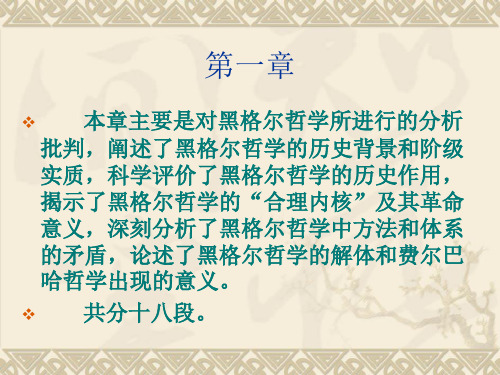
本章主要是对黑格尔哲学所进行的分析 批判,阐述了黑格尔哲学的历史背景和阶级 实质,科学评价了黑格尔哲学的历史作用, 揭示了黑格尔哲学的“合理内核”及其革命 意义,深刻分析了黑格尔哲学中方法和体系 的矛盾,论述了黑格尔哲学的解体和费尔巴 哈哲学出现的意义。 共分十八段。
第一部分:揭示黑格尔哲学的“合理内 核”,阐述唯物辩证法发展观的基本思想。 (第1-7段)
相反,德国哲学家则处于完全不同的条 件下,德国没有经过彻底的资产阶级民主革 命,它经过改良道路由地主经济转变为资本 主义经济。德国的哲学家不是革命者,他们 用哲学为普鲁士王国辩解,为普鲁士王国服 务,哲学家们得到普鲁士国家的支持,他们 被委派为大学教授,被任命为青年的导师; 他们的著作是法定的教科书。黑格尔哲学出 于歌颂普鲁士王国而被抬高到普鲁士王国的 国家哲学的地位。如此被封建王国推崇而被 革命代表者的自由派反对的哲学怎么能为革 命造舆论呢?
第6段,黑格尔辩证法的真实意义和革命性 质,唯物辩证法发展观的基本思想。
第一层,黑格尔辩证法的真实意义和革命 性质。原文指出:“黑格尔哲学的真实意义和 革命性质,正是在于它永远结束了人的思维和 行动的一切结果具有最终性质的看法。”“推 翻了一切关于最终的绝对真理和与之相应的人 类绝对状态的想法”。黑格尔辩证法的真实意 义和革命性质,不仅在于凡是现实的,都一定 要灭亡,而在于它彻底否定了关于人的认识和 行动的一切结果具有最终性质的看法。
从十八世纪末到十九世纪初,在德国发 生了哲学革命。这个革命表现在德国古典哲 学。这个哲学革命是由康德开始,中间经过 费希特、谢林到黑格尔,黑格尔学派解体过 程中又出现了费尔巴哈的唯物论。德国古典 哲学特别是黑格尔的唯心辩证法,反映了资 产阶级发展资本主义的要求,对保守的形而 上学观念是个很大的冲击,为在德国进行资 产阶级革命作了舆论准备。所以,思格斯说: 正象十八世纪的法国唯物论是法国革命的前 导一样,在十九世纪的德国“哲学革命也作 了政治变革的前导。”
费尔巴哈论第三部分
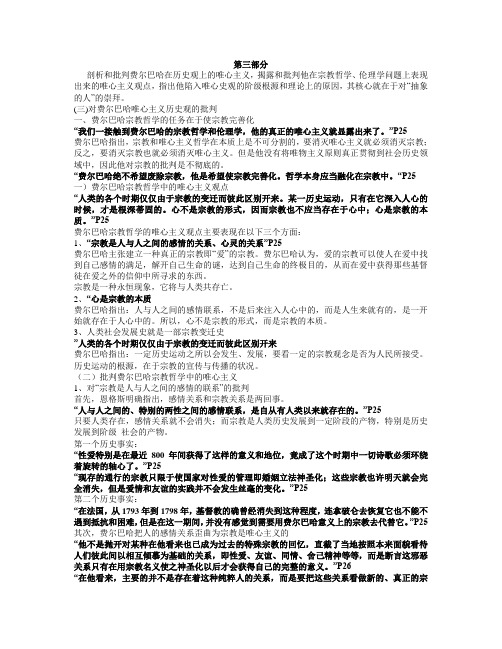
第三部分剖析和批判费尔巴哈在历史观上的唯心主义,揭露和批判他在宗教哲学、伦理学问题上表现出来的唯心主义观点,指出他陷入唯心史观的阶级根源和理论上的原因,其核心就在于对“抽象的人”的崇拜。
(三)对费尔巴哈唯心主义历史观的批判一、费尔巴哈宗教哲学的任务在于使宗教完善化“我们一接触到费尔巴哈的宗教哲学和伦理学,他的真正的唯心主义就显露出来了。
”P25费尔巴哈指出,宗教和唯心主义哲学在本质上是不可分割的,要消灭唯心主义就必须消灭宗教;反之,要消灭宗教也就必须消灭唯心主义。
但是他没有将唯物主义原则真正贯彻到社会历史领域中,因此他对宗教的批判是不彻底的。
“费尔巴哈绝不希望废除宗教,他是希望使宗教完善化。
哲学本身应当融化在宗教中。
“P25一)费尔巴哈宗教哲学中的唯心主义观点“人类的各个时期仅仅由于宗教的变迁而彼此区别开来。
某一历史运动,只有在它深入人心的时候,才是根深蒂固的。
心不是宗教的形式,因而宗教也不应当存在于心中;心是宗教的本质。
”P25费尔巴哈宗教哲学的唯心主义观点主要表现在以下三个方面:1、“宗教是人与人之间的感情的关系、心灵的关系”P25费尔巴哈主张建立一种真正的宗教即“爱”的宗教。
费尔巴哈认为,爱的宗教可以使人在爱中找到自己感情的满足,解开自己生命的谜,达到自己生命的终极目的,从而在爱中获得那些基督徒在爱之外的信仰中所寻求的东西。
宗教是一种永恒现象,它将与人类共存亡。
2、“心是宗教的本质费尔巴哈指出:人与人之间的感情联系,不是后来注入人心中的,而是人生来就有的,是一开始就存在于人心中的。
所以,心不是宗教的形式,而是宗教的本质。
3、人类社会发展史就是一部宗教变迁史”人类的各个时期仅仅由于宗教的变迁而彼此区别开来费尔巴哈指出:一定历史运动之所以会发生、发展,要看一定的宗教观念是否为人民所接受。
历史运动的根源,在于宗教的宣传与传播的状况。
(二)批判费尔巴哈宗教哲学中的唯心主义1、对“宗教是人与人之间的感情的联系”的批判首先,恩格斯明确指出,感情关系和宗教关系是两回事。
恩格斯《路德维希·费尔巴哈和德国古典哲学的终结》(全文版新)导读1

我们把沿着这个途径达不到而且任何
单个人都无法达到的“绝对真理”撇在一 边,而沿着实证科学和利用辩证思维对这 些科学成果进行概括的途径去追求可以达 到的相对真理。总之,哲学在黑格尔那里 完成了,一方面,因为他在自己的体系中 以最宏伟的方式概括了哲学的全部发展; 另一方面,因为他(虽然是不自觉地)给 我们指出了一条走出这些体系的迷宫而达 到真正地切实地认识世界的道路。
还有一点不应当忘记:黑格尔学派虽然 解体了,但是黑格尔哲学并没有被批判地 克服。
费尔巴哈打破了黑格尔的体系,简单地 把它抛在一旁。但是简单地宣布一种哲学 是错误的,还制服不了这种哲学。
像对民族的精神发展有过如此巨大影响 的黑格尔哲学这样的伟大创作,是不能用 干脆置之不理的办法来消除的。必须从它 的本来意义上“扬弃”它,
1、问题的提出
全部哲学,特别是近代哲学的重大的基 本问题,是思维和存在的关系问题。
2、哲学基本问题的第一个方面
思维对存在、精神对自然界的关系问题, 全部哲学的最高问题,像一切宗教一样, 其根源在于蒙昧时代的愚昧无知的观念。
但是,这个问题,只是在欧洲人从基督 教中世纪的长期冬眠中觉醒以后,才被十 分清楚地提了出来,才获得了它的完全的 意义。
正像在18世纪的法国一样,在19世纪的 德国,哲学革命也作了政治变革的前导。
但是这两个哲学革命看起来是多么不同 啊!法国人同整个官方科学,同教会,常 常也同国家进行公开的斗争;他们的著作 在国外,在荷兰或英国印刷,而他们本人 则随时都可能进巴士底狱。
相反,德国人是一些教授,一些由国家任
命的青年的导师,他们的著作是公认的教科 书,而全部发展的最终体系,即黑格尔的体 系,甚至在某种程度上已经被推崇为普鲁士 王国的国家哲学!
徐州工程学院必读书答案之费尔巴哈论
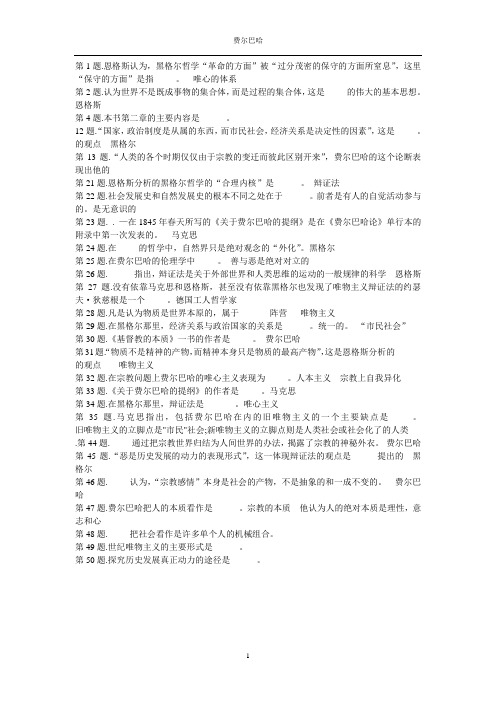
费尔巴哈第1题.恩格斯认为,黑格尔哲学“革命的方面”被“过分茂密的保守的方面所窒息”,这里“保守的方面”是指_____。
唯心的体系第2题.认为世界不是既成事物的集合体,而是过程的集合体,这是_____的伟大的基本思想。
恩格斯第4题.本书第二章的主要内容是______。
12题.“国家,政治制度是从属的东西,而市民社会,经济关系是决定性的因素”,这是_____。
的观点黑格尔第13题.“人类的各个时期仅仅由于宗教的变迁而彼此区别开来”,费尔巴哈的这个论断表现出他的___第21题.恩格斯分析的黑格尔哲学的“合理内核”是______。
辩证法第22题.社会发展史和自然发展史的根本不同之处在于______。
前者是有人的自觉活动参与的。
是无意识的第23题. ._—在1845年春天所写的《关于费尔巴哈的提纲》是在《费尔巴哈论》单行本的附录中第一次发表的。
马克思第24题.在_____的哲学中,自然界只是绝对观念的“外化”。
黑格尔第25题.在费尔巴哈的伦理学中_____。
善与恶是绝对对立的第26题.______指出,辩证法是关于外部世界和人类思维的运动的一般规律的科学恩格斯第27题.没有依靠马克思和恩格斯,甚至没有依靠黑格尔也发现了唯物主义辩证法的约瑟夫·狄慈根是一个_____。
德国工人哲学家_第28题.凡是认为物质是世界本原的,属于_______阵营唯物主义第29题.在黑格尔那里,经济关系与政治国家的关系是______。
统一的。
“市民社会”第30题.《基督教的本质》一书的作者是_____。
费尔巴哈第31题.“物质不是精神的产物,而精神本身只是物质的最高产物”,这是恩格斯分析的______的观点唯物主义第32题.在宗教问题上费尔巴哈的唯心主义表现为_____。
人本主义宗教上自我异化第33题.《关于费尔巴哈的提纲》的作者是_____。
马克思第34题.在黑格尔那里,辩证法是_______。
唯心主义第35题.马克思指出,包括费尔巴哈在内的旧唯物主义的一个主要缺点是_____。
徐州工程学院必读书费尔巴哈论完整版
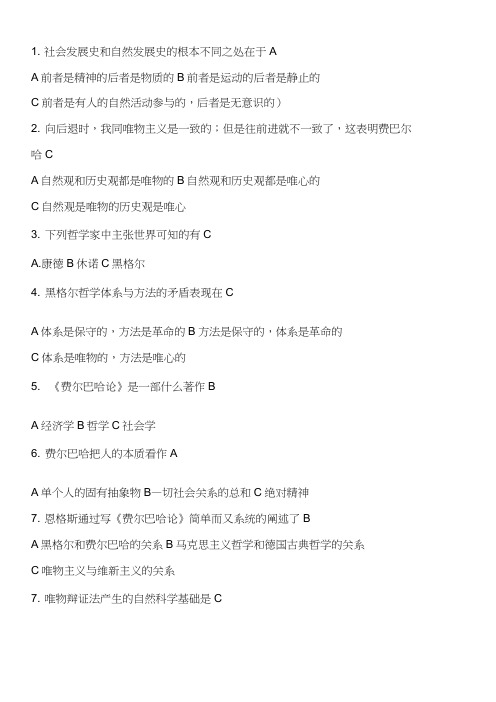
1. 社会发展史和自然发展史的根本不同之处在于AA前者是精神的后者是物质的B前者是运动的后者是静止的C前者是有人的自然活动参与的,后者是无意识的)2. 向后退时,我同唯物主义是一致的;但是往前进就不一致了,这表明费巴尔哈CA自然观和历史观都是唯物的B自然观和历史观都是唯心的C自然观是唯物的历史观是唯心3. 下列哲学家中主张世界可知的有CA.康德B休诺C黑格尔4. 黑格尔哲学体系与方法的矛盾表现在CA体系是保守的,方法是革命的B方法是保守的,体系是革命的C体系是唯物的,方法是唯心的5. 《费尔巴哈论》是一部什么著作BA经济学B哲学C社会学6. 费尔巴哈把人的本质看作AA单个人的固有抽象物B—切社会关系的总和C绝对精神7. 恩格斯通过写《费尔巴哈论》简单而又系统的阐述了BA黑格尔和费尔巴哈的关系B马克思主义哲学和德国古典哲学的关系C唯物主义与维新主义的关系7. 唯物辩证法产生的自然科学基础是CA哥白尼日心说B原子理论C十九世纪的三大发现8. 哲学家们只是用不同的方式解释世界,问题在于改变世界。
马克思的这句话强调了C A联系的观点B发展的观点C实践的观点9. 《逻辑学》一书的作者是AA黑格尔B恩格斯C费巴尔哈10. 认为“宗教感情”本身是社会的产物,不是抽象和一切不变的。
AA马克思B费尔巴哈C黑格尔11. 当自然科学的发展尚处在“收集材料”的阶段时,人们认识事物的方法往往是——CA唯物的B辩证的C形而上学的12. 人类的各个时期仅仅由于宗教的变迁而批次区别开来,费尔巴哈这个论断表现出他的BA形而上学B唯心史观C唯物主义13. 费尔巴哈哲学的“基本内核”是AA唯物主义B唯心主义C形而上学14. 恩格斯指出,费尔巴哈的社会历史观在根本上是BA唯物的B唯心的C辩证的15. 国家法律归根到底是由——决定的CA国家立法机构B法学家C社会经济关系16. 凡是认为物质是世界本质的,属于——阵营AA唯物主义B辩证法C唯心主义16•道德总是历史的和具体的,抽象的道德是不存在的,这是AA费尔巴哈的观点B恩格斯的观点C黑格尔的观点17. 《关于费尔巴哈的提纲》写于——BA在1843B在1845C在184818. 认为世界不是既成事物的集合体,而是过程的集合体,这是——的伟大的基本思想。
- 1、下载文档前请自行甄别文档内容的完整性,平台不提供额外的编辑、内容补充、找答案等附加服务。
- 2、"仅部分预览"的文档,不可在线预览部分如存在完整性等问题,可反馈申请退款(可完整预览的文档不适用该条件!)。
- 3、如文档侵犯您的权益,请联系客服反馈,我们会尽快为您处理(人工客服工作时间:9:00-18:30)。
1.社会发展史和自然发展史的根本不同之处在于A
A前者是精神的后者是物质的 B前者是运动的后者是静止的
C前者是有人的自然活动参与的,后者是无意识的)
2.向后退时,我同唯物主义是一致的;但是往前进就不一致了,这表明费巴尔哈C
A自然观和历史观都是唯物的 B自然观和历史观都是唯心的
C自然观是唯物的历史观是唯心
3.下列哲学家中主张世界可知的有C
A.康德 B休诺 C黑格尔
4.黑格尔哲学体系与方法的矛盾表现在C
A体系是保守的,方法是革命的 B方法是保守的,体系是革命的
C体系是唯物的,方法是唯心的
5.《费尔巴哈论》是一部什么著作B
A经济学 B哲学 C社会学
6.费尔巴哈把人的本质看作A
A单个人的固有抽象物 B一切社会关系的总和 C绝对精神
7.恩格斯通过写《费尔巴哈论》简单而又系统的阐述了B
A黑格尔和费尔巴哈的关系 B马克思主义哲学和德国古典哲学的关系
C唯物主义与维新主义的关系
7.唯物辩证法产生的自然科学基础是C
A哥白尼日心说 B原子理论 C十九世纪的三大发现
8.哲学家们只是用不同的方式解释世界,问题在于改变世界。
马克思的这句话强调了C
A联系的观点 B发展的观点 C实践的观点
9.《逻辑学》一书的作者是A
A黑格尔 B恩格斯 C费巴尔哈
10.——认为“宗教感情”本身是社会的产物,不是抽象和一切不变的。
A
A马克思 B费尔巴哈 C黑格尔
11.当自然科学的发展尚处在“收集材料”的阶段时,人们认识事物的方法往往是——C
A唯物的 B辩证的 C形而上学的
12.人类的各个时期仅仅由于宗教的变迁而批次区别开来,费尔巴哈这个论断表现出他的B
A形而上学 B唯心史观 C唯物主义
13.费尔巴哈哲学的“基本内核”是A
A唯物主义 B唯心主义 C形而上学
14.恩格斯指出,费尔巴哈的社会历史观在根本上是B
A唯物的 B唯心的 C辩证的
15.国家法律归根到底是由——决定的C
A国家立法机构 B法学家 C社会经济关系
16.凡是认为物质是世界本质的,属于——阵营A
A唯物主义 B辩证法 C唯心主义
16.道德总是历史的和具体的,抽象的道德是不存在的,这是——A
A费尔巴哈的观点 B恩格斯的观点 C黑格尔的观点
17.《关于费尔巴哈的提纲》写于——B
A在1843 B在1845 C在1848
18.认为世界不是既成事物的集合体,而是过程的集合体,这是——的伟大的基本思想。
B
A唯物论 B辩证法 C可知论
19.恩格斯所说的“下半载是唯物主义,下半载的唯心主义者”指的是——C A鲍威尔 B看不清 C费尔巴哈
20.在黑格尔之后对马克思恩格斯影响最大的哲学家是——B
A康德 B费尔巴哈 C看不清
21.黑格尔称之为“形而上学”的思维方法,往往真理与谬误,善于恶的对立看作是A
A绝对的 B相对的 C不存在的
22.“概念的辩证法本身就变成只是现实世界的辩证运动的自觉反映”,这是——B
A唯心辩证法的观点 B唯物辩证法的观点 C形而上学的观点
23.本书第一章的主要内容是——B
A评述黑格尔哲学 B评述费尔巴哈哲学 C评述斯达克的著作
24.消除了黑格尔哲学内在矛盾的哲学家是——B
A康德 B费尔巴哈 C马克思
25.黑格尔哲学属于——B
A唯物辩证法 B唯心辩证法 C形而上学唯物主义
26.马克思认为,人的本质——A
A是单个人所固有的抽象物 B主观想象 C宗教教义
27.恩格斯认为,德国和法国在历史上发生的宗教改革是由——引起的。
B
A文化的发展的 B政治关系 C经济关系
1.马克思指出,包括费尔巴哈在内的旧唯物主义的一个主要缺点是A
A不理解实践的意义 B不能正确回答物质与精神的关系 C不懂绝对与相对的关系
2.把唯物主义理解为追求物质贪图享乐,把唯心主义理解为追求美好理想,这种观点属于C
A客观唯物主义 B机械唯物主义 C庸俗唯物主义3.恩格斯所说的“在劳动发展史中找到了理解全部社会史的顾钥的新派别”是指B
A德国古典哲学 B马克思主义哲学 C法国唯物主义哲学
8.凡是现实的都是合乎理性的,凡是合乎理性的都是现实的,这一命题的涵义是C
A所有现存的都是合理的 B C只有符合必然性的才是合理的
9.德国古典哲学是—的直接理论来源C
A古典哲学 B中世纪哲学 C马克思主义哲学
11.在马克思看来,生活社会的本质上是B
A精神的 B实践的 C自然物质的
12.恩格斯阐述的哲学基本问题是B
A运动和静止的关系问题 B思维和存在的关系问题 C对立和统一的关系问题
13.认为世界是绝对精神的外化,这是—的观点C
A康德 B休谟 C黑格尔
14.黑格尔学说解体的理论原因是C
A资产阶级和封建贵族的阶级斗争 B资产阶级和无产阶级的斗争
C黑格尔哲学的体系和方法的矛盾
15.黑格尔哲学具体意义C
A坚持了物质的单一性 B坚持了事物的普遍联系
C彻底否定了关于人的思维和行动的一切后果具有最终性质的看法
17.摒弃费尔巴哈的哲学的工作,是由马克思在—--开始的B
A《德意志意识形态》 B《神圣家族》 C《关于费尔巴哈的提纲》
18.恩格斯认为,黑格尔哲学“革命的方面”被“过分茂密的保守的方面所窒息”这里保守的方面是指A
A唯心的体系 B辩证的方法 C唯物的体系
谁认为宗教感情本身是社会产物马克思
旧维物主义的历史观其不彻底之处在于
世纪维物主义的主要形式是什么
费尔巴哈哲学的基本内核是什么唯物主义
瑟夫狄慈根是哪国人德国
费论的作者是写于哪年恩格斯 1886
黑学派解体的理论原因是体系与方法矛盾
国家法律归根到底是由什么决定的社会经济关系
十九世界自然科学的三大发现是什么细胞学说,能量守恒和转化定律,达尔文的进化论
费把人的本质看做是单个人的固有抽象物
实践是检验认识是否有真理性标准是谁提的马克思
基督教本质的作者费尔巴哈
费论是一部什么著作哲学
1.恩格斯认为,黑格尔哲学“革命的方面”被“过分茂密的保守的方面所窒息”,这里“保守的方面”是指_____。
唯心的体系
2.认为世界不是既成事物的集合体,而是过程的集合体,这是_____的伟大的基本思想。
恩格斯
3.本书第二章的主要内容是______。
分析费尔巴哈的唯物主义以及它的宗教哲学的伦理学
4.“国家,政治制度是从属的东西,而市民社会,经济关系是决定性的因素”,这是_____的观点黑格尔
5.“人类的各个时期仅仅由于宗教的变迁而彼此区别开来”,费尔巴哈的这个论断表现出他的___ 唯心史观
6.恩格斯分析的黑格尔哲学的“合理内核”是______。
辩证法
7.社会发展史和自然发展史的根本不同之处在于______。
前者是有人的自觉活动参与的,后者是无意识的
8.—在1845年春天所写的《关于费尔巴哈的提纲》是在《费尔巴哈论》单行本的附录中第一次发表的。
马克思
9.在_____的哲学中,自然界只是绝对观念的“外化”。
黑格尔
10.在费尔巴哈的伦理学中_____。
善与恶是绝对对立的
11.______指出,辩证法是关于外部世界和人类思维的运动的一般规律的科学恩格斯
12.没有依靠马克思和恩格斯,甚至没有依靠黑格尔也发现了唯物主义辩证法的
约瑟夫·狄慈根是一个_____。
德国工人哲学家
13.凡是认为物质是世界本原的,属于_______阵营唯物主义
14.在黑格尔那里,经济关系与政治国家的关系是______。
统一的。
“市民社会”
15.《基督教的本质》一书的作者是_____。
费尔巴哈
16.“物质不是精神的产物,而精神本身只是物质的最高产物”,这是恩格斯分析的______的观点唯物主义
17.在宗教问题上费尔巴哈的唯心主义表现为_____。
人本主义宗教上自我异化
18.《关于费尔巴哈的提纲》的作者是_____。
马克思
19.在黑格尔那里,辩证法是_______。
唯心主义
20.马克思指出,包括费尔巴哈在内的旧唯物主义的一个主要缺点是_____。
旧唯物主义的立脚点是"市民"社会;新唯物主义的立脚点则是人类社会或社会化了的人类
21._____通过把宗教世界归结为人间世界的办法,揭露了宗教的神秘外衣。
费尔巴哈
22.“恶是历史发展的动力的表现形式”,这一体现辩证法的观点是______提出的黑格尔
23._____认为,“宗教感情”本身是社会的产物,不是抽象的和一成不变的。
马克思
24.费尔巴哈把人的本质看作是______。
宗教的本质他认为人的绝对本质是理性,意志和心
25._____把社会看作是许多单个人的机械组合。
26.世纪唯物主义的主要形式是______。
27.探究历史发展真正动力的途径是______。
